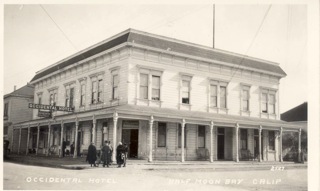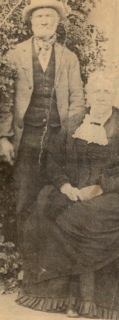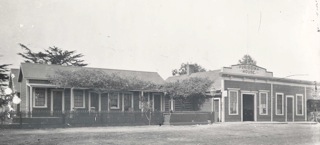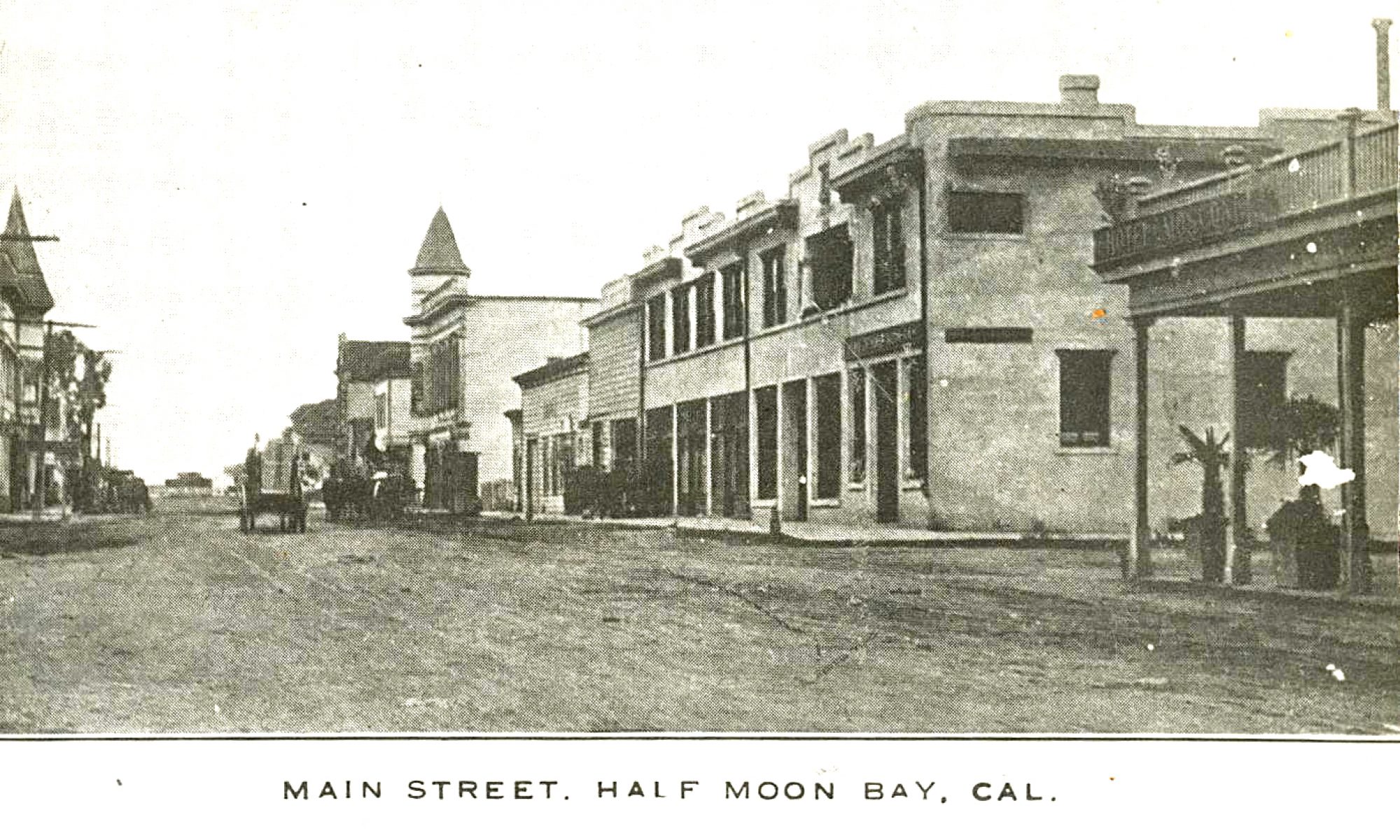A new-old story by June Morrall. I wrote this piece in the 1970s (don’t hold it against me!)
The San Mateo -Pescadero Stagecoach, with a stop at Half Moon Bay
[Image below: A modernized Occidental Hotel. It was originally 3 stories tall, but I believe a fire took out the top floor. The hotel was famous because this is where the stage stopped to drop off passengers, the mail, and to give the horses water and a rest before heading south to the “big resort” of Pescadero with its enticing Pebble Beach.]

When ten-year-old Mary McGinty stepped off the [Southern Pacific] train at San Mateo, she heard Taft and Garretson’s stagecoach driver call out: “Stage for Pescadero.”
Although the day before a total of 23 passengers piled in and and on the six-horse Concord, today only Mary and her mom [who bought tickets for as far as Half Moon Bay, then called Spanishtown], climbed into the coach.
Moments later, two gentlemen joined them–and Richard ‘Beefstake” Dougherty , who once owned the stage running between San Mateo and Purisima, sat up top with the driver.
After swinging into his seat, someone handed the driver the Wells Fargo strongbox and the mail bags. The driver, who wore a western hat low over his forehead, shouted commands at the horses. With a loud crack of the whip, the Concord stage left San Mateo about 10 a.m., heading up B Street [humorously called “Avenue de la Mud.”]
At Fifth Avenue, the coach turned in a westerly direction, following the creek for several miles before stopping at the San Mateo toll station. Here the driver, who paid fifty cents trotted the horses up the gentle grade toward the picturesque Crystal Springs Hotel.
By now, Richard Dougherty detected this particular driver’s weakness for alcohol. But at the time, he gave it little thought. This was merely part of the risk involved when traveling by stage along the scenic (and probably well-maintained San Mateo-Spanishtown turnpike.
At the Crystal Springs Hotel slipped into view, the travelers absorbed the pleasant surroundings. Before long, the driver pulled the stage to an abrupt halt under the shade of a large Oak tree. And as soon as he jumped down, the driver sauntered over to the saloon to quench his thirst.
When he finally emerged from the bar, Mary nudged her mom, and called attention to the driver, who appeared slightly unsteady on his feet. He managed to climb on board anyway, and Mary recalled heading along the west bank of today’s lower Crystal Springs Lake for about two miles. This time, the driver passed at the San Felix Station, where he dropped off the mail. He also indulged in a stiff drink or two, spending more time in the saloon, than the tight schedule allowed.
In this high-spirited condition, the driver ascended the twisting mountain road leading over the hill toward Spanishtown. As the stage rounded one of the first sharp curves, the driver pulled into the next stop at Byrne’s Store. Despite a flurry of pleas and warnings from the nervous passengers, the driver entered the saloon there, to buy himself yet another drink.
Back on the road again, the stage crawled up the steep grade. Dougherty casually mentioned it would be dark before they reached San Gregorio. But as soon as Dougherty said this, he regretted his words. When the stage reached the summit, the inebriated driver suddenly announced in a booming voice: “This stage will arrive in Spanishtown on time or bust!”
With his ominous words left hanging in the air, he whipped the horses into a fast run down the winding turnpike [which San Mateo Count bought in the 1880s.]
As the stage raced down the serpentine road, the frightened passengers frequently glanced over the side, shivering when the thought crossed their minds that the horses might run away. There was nothing the passengers could do as the coach continued to pick up speed; soon it was obvious that the coach was out of the driver’s control.
As one of the gentleman saw the sharp bend in the near distance, he closed his eyes, and all at once everyone panicked in his or her own way.
Richard Dougherty, who was still sitting up top with the drunk stage driver, calmly appraised the situation. There was only one thing to do: When “Beefstake” refused to turn over the reins, Dougherty punched him in the face, knocking the driver out. With the intoxicated driver out of the way, Dougherty now took control, expertly slowing down the speed of the runaway horses. Slowing them down to a gait. The passengers took a deep breath and a unanimous sigh of relief could be heard. Now Richard Dougherty easily maneuvered the hairpin curves on two wheels.
As he approached the toll house near the village of Spanishtown, [where occasionally a fast horseman race through free] the toll-keeper noted the sleeping stage driver. But he said nothing and opened the gate. Fifteen minutes later the stage crossed Pilarcitos Creek, safely rolling into town about lunchtime.
Once the stagecoach pulled to a halt in front of the Occidental Hotel [which later became the site of the U.S. post office, which moved again], Mary McGinty confided that despite the scary experience, she actually enjoyed the thrilling ride–her first trip to Spanishtown.
The remaining passengers were headed for the resort town of Pescadero, and they were joined by others waiting to board in front of the Occidental Hotel.
Doughtery stayed in control of the stage, following the sea shore route to Pescadero. [This was not the only stage line; there were other competitors such as S.L. Knight whose passengers boarded at Redwood City, instead of San Mateo, enjoying the “scenic route” through the redwood tree canyons to Pescadero.
Regular stage service required the maintenance of three stables located between San Mateo and Pescadero. The largest service station was located in Half Moon Bay where “Buckskin” Bob Rawls, a veteran driver, was the stable boss.
[Image below: The legendary “Buckskin Bob Rawls” and his wife lived in Half Moon Bay.]

When Levy Brothers bought Andrew Taft’s stagecoach line in the 1880s, they hired popular Ed Campbell for their San Mateo-Pescadero run. For years, Ed lived in the shadow of the legendary stories glorifying “Buckskin” Bob Rawls, whose fame emanated from his ability to take the corner by the Occidental Hotel on two wheels without tipping over.
Fed up with the legend, Ed Campbell planned to prove he could carry on the tradition himself. He decided to prove that he could emulate “Buckskin” Rawls on a special day that drew crowds to Spanishtown. It was a day when clusters of people would be standing in front of the Occidental Hotel waiting for the stage to come.
Ed prepared his strategy during his regular run down Main Street at 15 mph. [Later, observers stated that Ed seemed so absorbed in his plan that he forgot about the two dozen passengers he carried including some frightened folks standing on the running board, clinging to the door handles.]
On this particular day as stage driver Ed Campbell neared Kelly Avenue, he suddenly whipped the horses into a very fast run, causing the passengers to lean to one side as the stage successfully rounded the corner on two wheels.
Everybody was amazed as the coach skidded around the turn without tipping over. But as it reached the Occidental Hotel, the stage failed to return to an upright position. No, instead the coach toppled over to Ed Campbell’s embarassment. That was not his plan.
To his credit, no one was injured, and he received a severe reprimand from his employers. In the end, “Buckskin” Bob Rawls retained his legendary reputation as the only stagecoach driver who could make the turn safely at the Occidental Hotel on two wheels.
—————
About Richard “Dick” Dougherty, article is circa 1909
“Purissima, whose Spanish name means pure and immaculate, is known today as the little town that almost flourished. Located four miles south of Half Moon Bay and one-half mile inland from Coast Highway 1, the only remains of this small community are weathered tombstones in the overgrown graveyard, and an old gray schoolhouse attesting to the once populous coastside school district.
“Built around Dick Doughtery’s saloon-hotel, a general store and dance hall owned by Henry Dobbel and a post office run by Julia Brittan, the once thriving village boasted boasted the first school, first religious services, and the first mechanics and tradesman of the region. The town rose with Dobbel’s arrival from Germany in 1868, when he built an establishment enticing sportsmen to the abundant hunting and fishing area. A prominent citizen, his pretentious home stood on the corner of Highway 1 and Verde Road, across from the ranch of John Butts., another German-born community leader. Lumbering by Borden and Hatch became a flourishing enterprise in the community, with redwood trees up Purissima Canyon furnishing shingles for surrounding towns.
“Oil companies set up derricks to drill for black gold , and soon a few producing wells were throbbing faintly near the old cemetery. Death claimed many Purissima citizens, and with them died the promise of a growing community. Raging disease, fire, and human hands destroyed the little town, and the time soon came when people failed to stop at Purissima altogether.”
[Image below: Purissima in happier times.[

